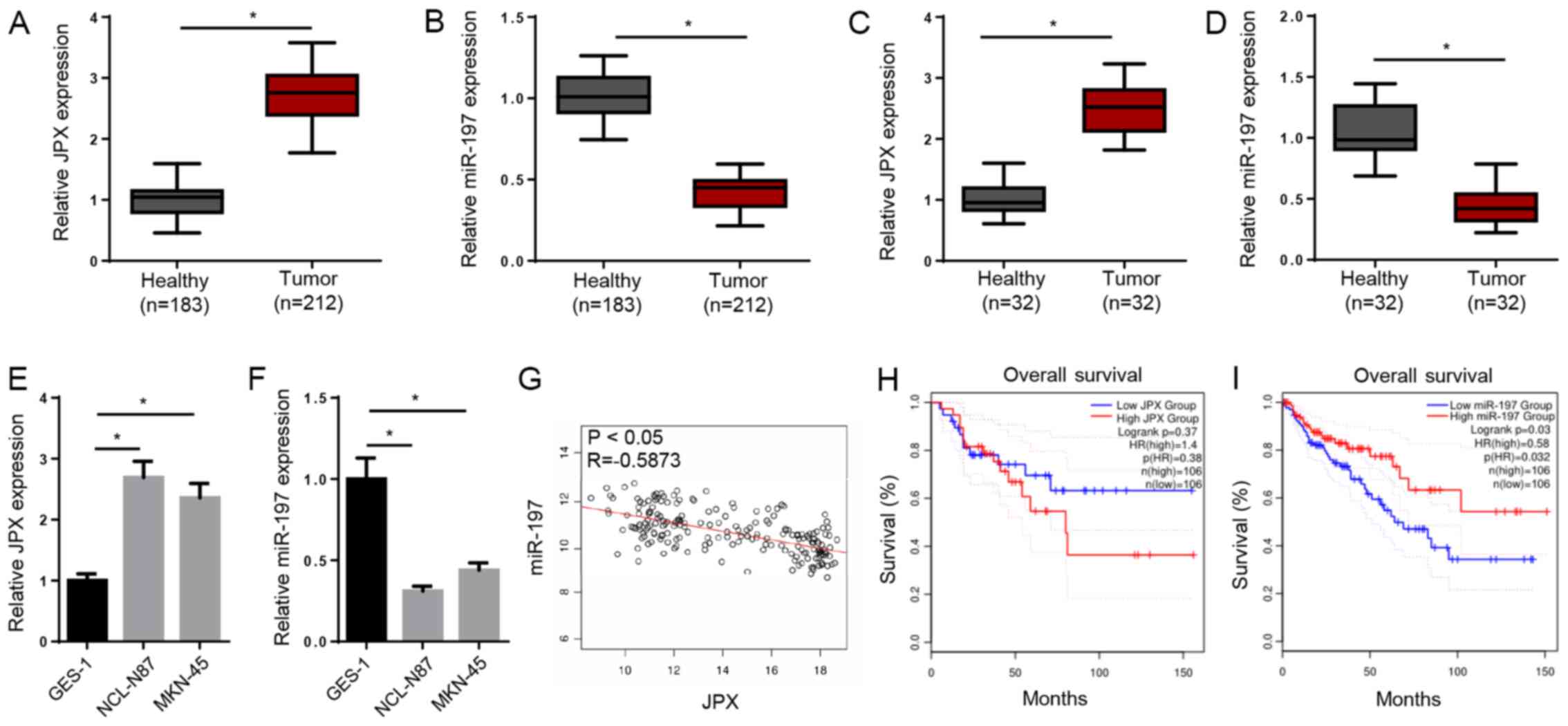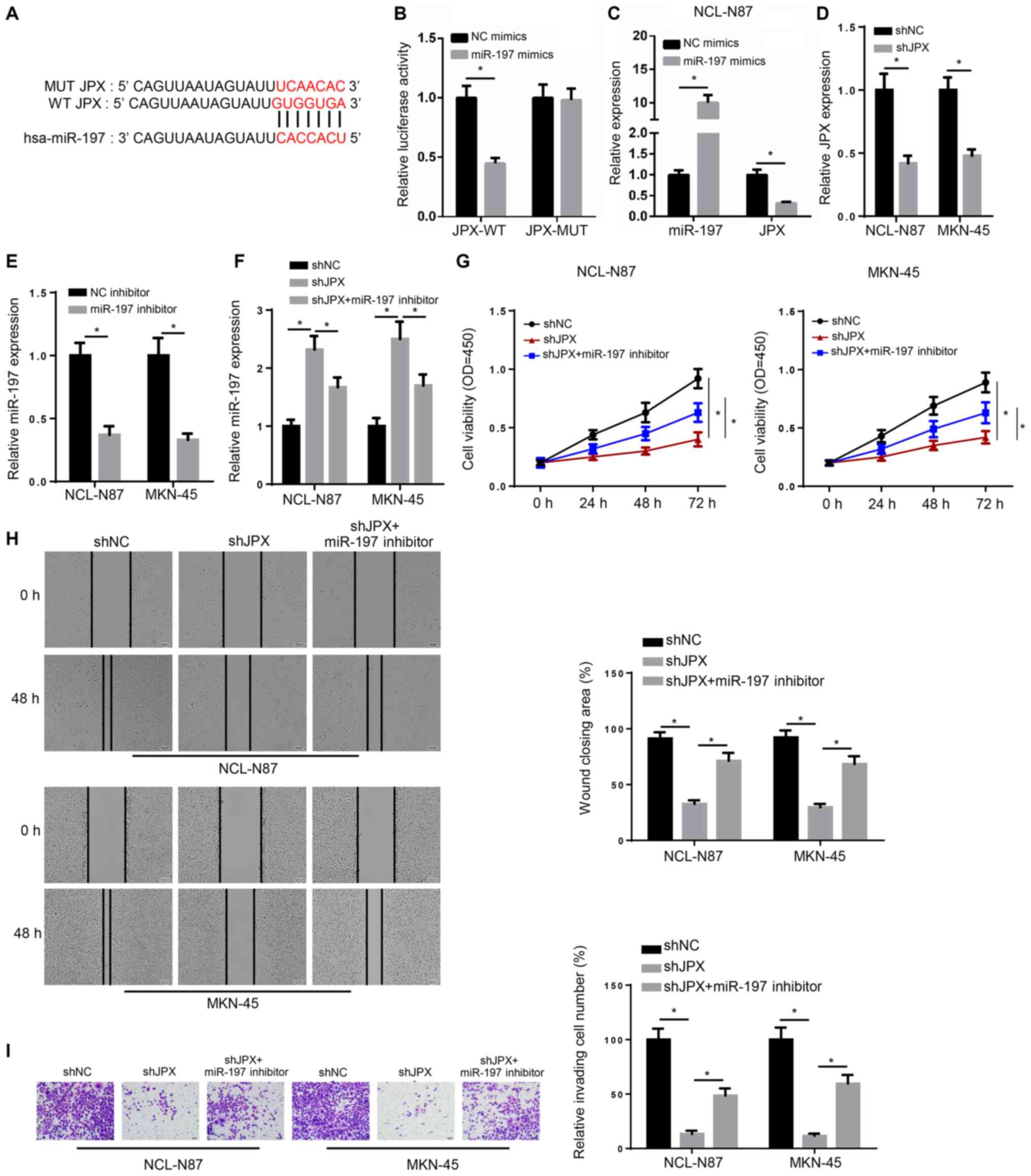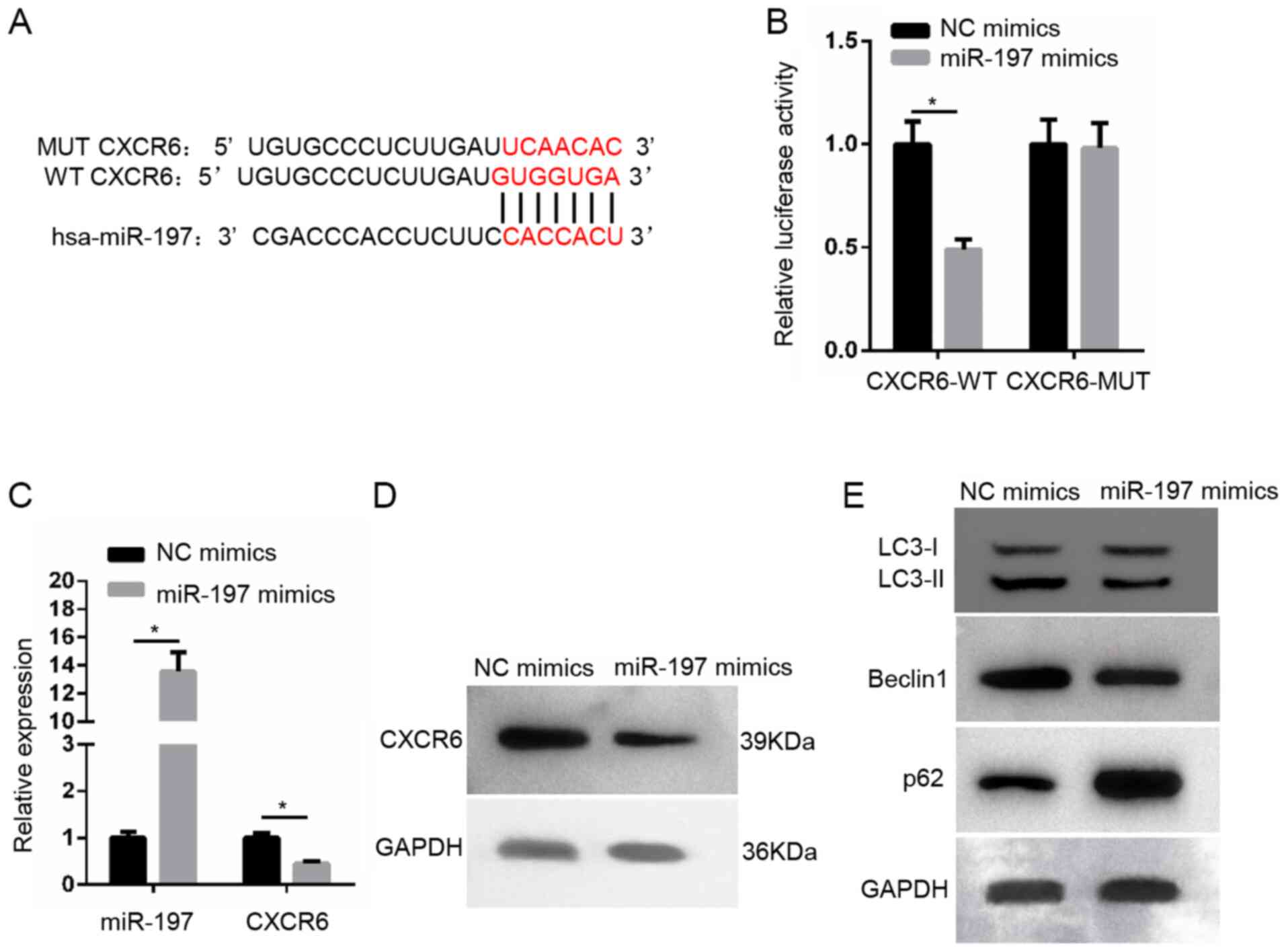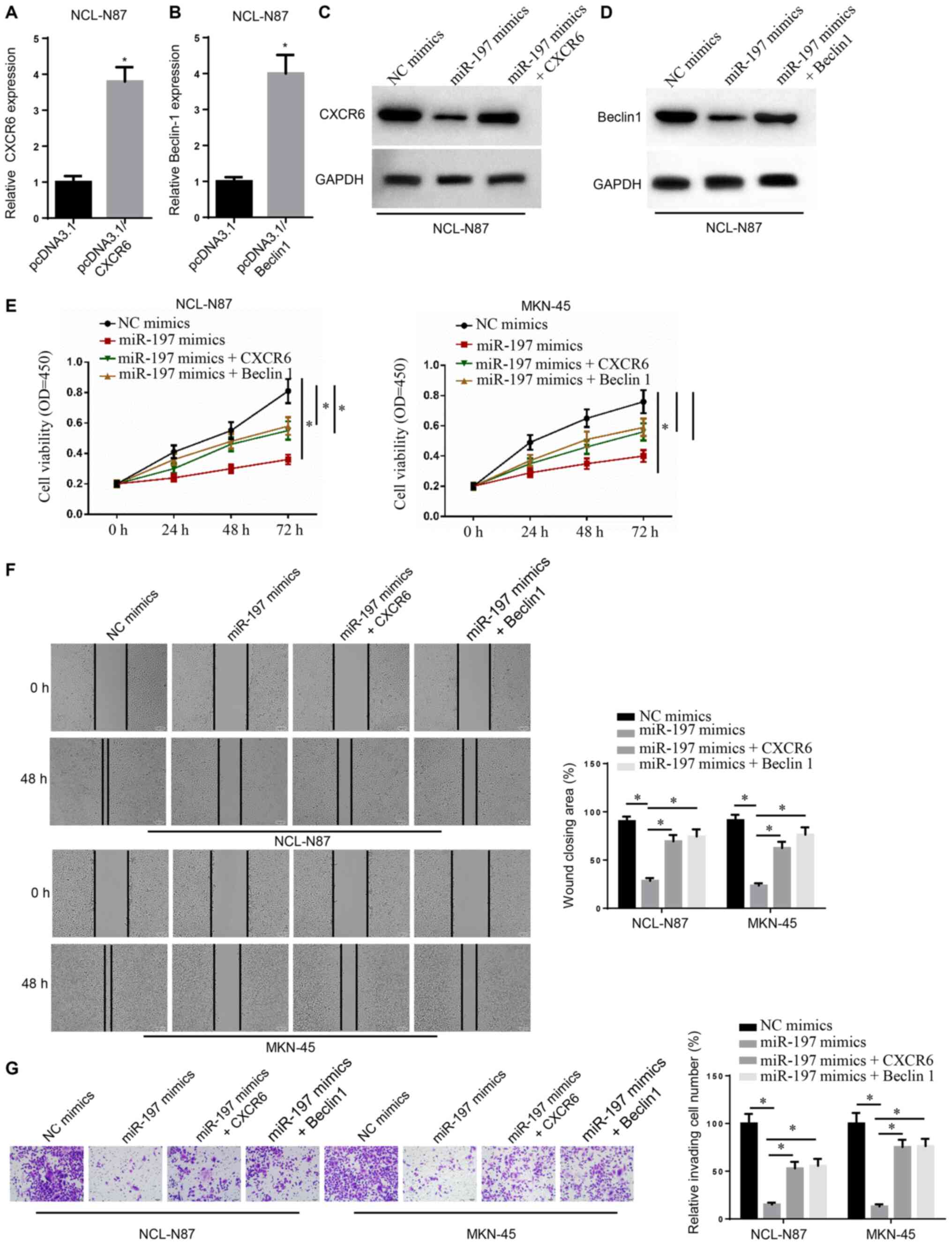|
1
|
Li A, Li J, Lin J, Zhuo W and Si J:
COL11A1 is overexpressed in gastric cancer tissues and regulates
proliferation, migration and invasion of HGC-27 gastric cancer
cells in vitro. Oncol Rep. 37:333–340. 2017. View Article : Google Scholar
|
|
2
|
Bray F, Ferlay J, Soerjomataram I, Siegel
RL, Torre LA and Jemal A: Global cancer statistics 2018: GLOBOCAN
estimates of incidence and mortality worldwide for 36 cancers in
185 countries. CA Cancer J Clin. 68:394–424. 2018. View Article : Google Scholar
|
|
3
|
Maimaiti Y, Maimaitiming M, Li Y, Aibibula
S, Ainiwaer A, Aili A, Sun Z and Abudureyimu K: SSH1 expression is
associated with gastric cancer progression and predicts a poor
prognosis. BMC Gastroenterol. 18:122018. View Article : Google Scholar
|
|
4
|
Wei GH and Wang X: lncRNA MEG3 inhibit
proliferation and metastasis of gastric cancer via p53 signaling
pathway. Eur Rev Med Pharmacol Sci. 21:3850–3856. 2017.
|
|
5
|
Dai F, Xuan Y, Jin JJ, Yu S, Long ZW, Cai
H, Liu XW, Zhou Y, Wang YN, Chen Z and Huang H: CtBP2
overexpression promotes tumor cell proliferation and invasion in
gastric cancer and is associated with poor prognosis. Oncotarget.
8:28736–28749. 2017. View Article : Google Scholar
|
|
6
|
Tsukamoto Y, Uchida T, Karnan S, Noguchi
T, Nguyen LT, Tanigawa M, Takeuchi I, Matsuura K, Hijiya N and
Nakada C: Genome-wide analysis of DNA copy number alterations and
gene expression in gastric cancer. J Pathol. 216:471–482. 2008.
View Article : Google Scholar
|
|
7
|
Ruan X, Li P and Cao H: Identification of
transcriptional regulators that bind to long noncoding RNAs by RNA
pull-down and RNA immunoprecipitation. Methods Mol Biol.
1783:185–191. 2018. View Article : Google Scholar
|
|
8
|
Liu K, Mao X, Chen Y, Li T and Ton H:
Regulatory role of long non-coding RNAs during reproductive
disease. Am J Transl Res. 10:1–12. 2018.
|
|
9
|
Wu X, Zhang P, Zhu H, Li S, Chen X and Shi
L: Long noncoding RNA FEZF1-AS1 indicates a poor prognosis of
gastric cancer and promotes tumorigenesis via activation of Wnt
signaling pathway. Biomed Pharmacother. 96:1103–1108. 2017.
View Article : Google Scholar
|
|
10
|
Nie FQ, Ma S, Xie M, Liu YW, De W and Liu
XH: Decreased long noncoding RNA MIR31HG is correlated with poor
prognosis and contributes to cell proliferation in gastric cancer.
Tumour Biol. 37:7693–7701. 2016. View Article : Google Scholar
|
|
11
|
Shao Y, Chen H, Jiang X, Chen S, Li P, Ye
M, Li Q, Sun W and Guo J: Low expression of lncRNA-HMlincRNA717 in
human gastric cancer and its clinical significances. Tumour Biol.
35:9591–9595. 2014. View Article : Google Scholar
|
|
12
|
Zeng S, Xie X, Xiao YF, Tang B, Hu CJ,
Wang SM, Wu YY, Dong H, Li BS and Yang SM: Long noncoding RNA
LINC00675 enhances phosphorylation of vimentin on Ser83 to suppress
gastric cancer progression. Cancer Lett. 412:179–187. 2018.
View Article : Google Scholar
|
|
13
|
Sun M, Xia R, Jin F, Xu T, Liu Z, De W and
Liu X: Downregulated long noncoding RNA MEG3 is associated with
poor prognosis and promotes cell proliferation in gastric cancer.
Tumour Biol. 35:1065–1073. 2014. View Article : Google Scholar
|
|
14
|
Shen W, Yuan Y, Zhao M, Li J, Xu J, Lou G,
Zheng J, Bu S, Guo J and Xi Y: Novel long non-coding RNA GACAT3
promotes gastric cancer cell proliferation through the IL-6/STAT3
signaling pathway. Tumor Biol. 37:14895–14902. 2016. View Article : Google Scholar
|
|
15
|
Liu X, Wang Y, Sun L, Min J, Liu J, Chen
D, Zhang H, Zhang H, Zhang H, Zhou Y and Liu L: Long noncoding RNA
BC005927 upregulates EPHB4 and promotes gastric cancer metastasis
under hypoxia. Cancer Sci. 109:988–1000. 2018. View Article : Google Scholar
|
|
16
|
Wang ZQ, He CY, Hu L, Shi HP, Li JF, Gu
QL, Su LP, Liu BY, Li C and Zhu Z: Long noncoding RNA UCA1 promotes
tumour metastasis by inducing GRK2 degradation in gastric cancer.
Cancer Lett. 408:10–21. 2017. View Article : Google Scholar
|
|
17
|
Wang P, Liu X, Han G, Dai S, Ni Q, Xiao S
and Huang J: Downregulated lncRNA UCA1 acts as ceRNA to adsorb
microRNA-498 to repress proliferation, invasion and epithelial
mesenchymal transition of esophageal cancer cells by decreasing
ZEB2 expression. Cell Cycle. 18:2359–2376. 2019. View Article : Google Scholar
|
|
18
|
Liao Z, Li Y, Zhou Y, Huang Q and Dong J:
MicroRNA-197 inhibits gastric cancer progression by directly
targeting metadherin. Mol Med Rep. 17:602–611. 2018.
|
|
19
|
Chen Z, Ju H, Zhao T, Yu S, Li P, Jia J,
Li N, Jing X, Tan B and Li Y: hsa_circ_0092306 targeting miR-197-3p
promotes gastric cancer development by regulating PRKCB in MKN-45
cells. Mol Ther Nucleic Acids. 18:617–626. 2019. View Article : Google Scholar
|
|
20
|
Luan X and Wang Y: LncRNA XLOC_006390
facilitates cervical cancer tumorigenesis and metastasis as a ceRNA
against miR-331-3p and miR-338-3p. J Gynecol Oncol. 29:e952018.
View Article : Google Scholar
|
|
21
|
Zhang G, Li S, Lu J, Ge Y, Wang Q, Ma G,
Zhao Q, Wu D, Gong W, Du M, et al: LncRNA MT1JP functions as a
ceRNA in regulating FBXW7 through competitively binding to
miR-92a-3p in gastric cancer. Mol Cancer. 17:872018. View Article : Google Scholar
|
|
22
|
Liang H, Yu T, Han Y, Jiang H, Wang C, You
T, Zhao X, Shan H, Yang R, Yang L, et al: LncRNA PTAR promotes EMT
and invasion-metastasis in serous ovarian cancer by competitively
binding miR-101-3p to regulate ZEB1 expression. Mol Cancer.
17:1192018. View Article : Google Scholar
|
|
23
|
Livak K and Schmittgen TD: Analysis of
relative gene expression data using real-time quantitative PCR and
the 2(-Delta Delta C(T)) method. Methods. 25:402–408. 2001.
View Article : Google Scholar
|
|
24
|
Yang Q, Yu Y, Sun Z and Pan Y: Long
non-coding RNA PVT1 promotes cell proliferation and invasion
through regulating miR-133a in ovarian cancer. Biomed Pharmacother.
106:61–67. 2018. View Article : Google Scholar
|
|
25
|
Giovannucci E: Modifiable risk factors for
colon cancer. Gastroenterol Clin North Am. 31:925–943. 2002.
View Article : Google Scholar
|
|
26
|
Cavatorta O, Scida S, Miraglia C, Barchi
A, Nouvenne A, Leandro G, Meschi T, De'Angelis GL and Di Mario F:
Epidemiology of gastric cancer and risk factors. Acta Biomed.
89:82–87. 2018.
|
|
27
|
Tan H, Zhang S, Zhang J, Zhu L, Chen Y,
Yang H, Chen Y, An Y and Liu B: Long non-coding RNAs in gastric
cancer: New emerging biological functions and therapeutic
implications. Theranostics. 10:8880–8902. 2020. View Article : Google Scholar
|
|
28
|
Sun DE and Ye SY: Emerging roles of long
noncoding RNA regulator of reprogramming in cancer treatment.
Cancer Manag Res. 12:6103–6112. 2020. View Article : Google Scholar
|
|
29
|
Pan L, Liang W, Gu J, Zang X, Huang Z, Shi
H, Chen J, Fu M, Zhang P, Xiao X, et al: Long noncoding RNA DANCR
is activated by SALL4 and promotes the proliferation and invasion
of gastric cancer cells. Oncotarget. 9:1915–1930. 2017. View Article : Google Scholar
|
|
30
|
Liu YW, Sun M, Xia R, Zhang EB, Liu XH,
Zhang ZH, Xu TP, De W, Liu BR and Wang ZX: LincHOTAIR
epigenetically silences miR34a by binding to PRC2 to promote the
epithelial-to-mesenchymal transition in human gastric cancer. Cell
Death Dis. 6:e18022015. View Article : Google Scholar
|
|
31
|
Mao Y, Liu R, Zhou H, Yin S, Zhao Q, Ding
X and Wang H: Transcriptome analysis of miRNA-lncRNA-mRNA
interactions in the malignant transformation process of gastric
cancer initiation. Cancer Gene Ther. 24:267–275. 2017. View Article : Google Scholar
|
|
32
|
Wang YY, Wu ZY, Wang GC, Liu K, Niu XB, Gu
S and Meng JS: LINC00312 inhibits the migration and invasion of
bladder cancer cells by targeting miR-197-3p. Tumor Biol.
37:14553–14563. 2016. View Article : Google Scholar
|
|
33
|
Chen Y and Yang C: miR-197-3p-induced
downregulation of lysine 63 deubiquitinase promotes cell
proliferation and inhibits cell apoptosis in lung adenocarcinoma
cell lines. Mol Med Rep. 17:3921–3927. 2018.
|
|
34
|
Darash-Yahana M, Gillespie JW, Hewitt SM,
Chen YY, Maeda S, Stein I, Singh SP, Bedolla RB, Peled A, Troyer
DA, et al: The chemokine CXCL16 and its receptor, CXCR6, as markers
and promoters of inflammation-associated cancers. PLoS One.
4:e66952009. View Article : Google Scholar
|
|
35
|
Deng L, Chen N, Li Y, Zheng H and Lei Q:
CXCR6/CXCL16 functions as a regulator in metastasis and progression
of cancer. Biochim Biophys Acta. 1806:42–49. 2010.
|
|
36
|
Ma Y, Xu X and Luo M: CXCR6 promotes tumor
cell proliferation and metastasis in osteosarcoma through the Akt
pathway. Cell Immunol. 311:80–85. 2017. View Article : Google Scholar
|
|
37
|
Gao Q, Zhao YJ, Wang XY, Qiu SJ, Shi YH,
Sun J, Yi Y, Shi JY, Shi GM, Ding ZB, et al: CXCR6 upregulation
contributes to a proinflammatory tumor microenvironment that drives
metastasis and poor patient outcomes in hepatocellular carcinoma.
Cancer Res. 72:3546–3556. 2012. View Article : Google Scholar
|
|
38
|
Jin JJ, Dai FX, Long ZW, Cai H, Liu XW,
Zhou Y, Hong Q, Dong QZ, Wang YN and Huang H: CXCR6 predicts poor
prognosis in gastric cancer and promotes tumor metastasis through
epithelial-mesenchymal transition. Oncol Rep. 37:3279–3286. 2017.
View Article : Google Scholar
|
|
39
|
Li Y, Fu LX, Zhu WL, Shi H, Chen LJ and Ye
B: Blockade of CXCR6 reduces invasive potential of gastric cancer
cells through inhibition of AKT signaling. Int J Immunopathol
Pharmacol. 28:194–200. 2015. View Article : Google Scholar
|
|
40
|
Zhai QL, Hu XD, Xiao J and Yu DQ:
Astragalus polysaccharide may increase sensitivity of cervical
cancer HeLa cells to cisplatin by regulating cell autophagy.
Zhongguo Zhong Yao Za Zhi. 43:805–812. 2018.(In Chinese).
|
|
41
|
Xu Z, Yan Y, Zeng S, Qian L, Dai S, Xiao
L, Wang L, Yang X, Xiao Y and Gong Z: Reducing autophagy and
inducing G1 phase arrest by aloperine enhances radio-sensitivity in
lung cancer cells. Oncol Rep. 43:1541–1548. 2017.
|
|
42
|
Masuda G, Yashiro M, Kitayama K, Miki Y,
Kasashima H, Kinoshita H, Morisaki T, Fukuoka T, Hasegawa T,
Sakurai K, et al: Clinicopathological correlations of
autophagy-related proteins LC3, Beclin 1 and p62 in gastric cancer.
Anticancer Res. 36:129–136. 2016.
|
|
43
|
Geng QR, Xu DZ, He LJ, Lu JB, Zhou ZW,
Zhan YQ and Lu Y: Beclin-1 expression is a significant predictor of
survival in patients with lymph node-positive gastric Cancer. PLoS
One. 7:e459682012. View Article : Google Scholar
|
|
44
|
Valencia T, Kim JY, Abu-Baker S,
Moscat-Pardos J, Ahn CS, Reina-Campos M, Duran A, Castilla EA,
Metallo CM, Diaz-Meco MT and Moscat J: Metabolic reprogramming of
stromal fibroblasts through p62-mTORC1 signaling promotes
inflammation and tumorigenesis. Cancer Cell. 26:121–135. 2014.
View Article : Google Scholar
|
|
45
|
Zhang J, Yang S, Xu B, Wang T, Zheng Y,
Liu F, Ren F, Jiang J, Shi H, Zou B, et al: p62 functions as an
oncogene in colorectal cancer through inhibiting apoptosis and
promoting cell proliferation by interacting with the vitamin D
receptor. Cell Prolif. 52:e125852019. View Article : Google Scholar
|
|
46
|
Adams O, Dislich B, Berezowska S, Schläfli
AM, Seiler CA, Kröll D, Tschan MP and Langer R: Prognostic
relevance of autophagy markers LC3B and p62 in esophageal
adenocarcinomas. Oncotarget. 7:39241–39255. 2016. View Article : Google Scholar
|


















